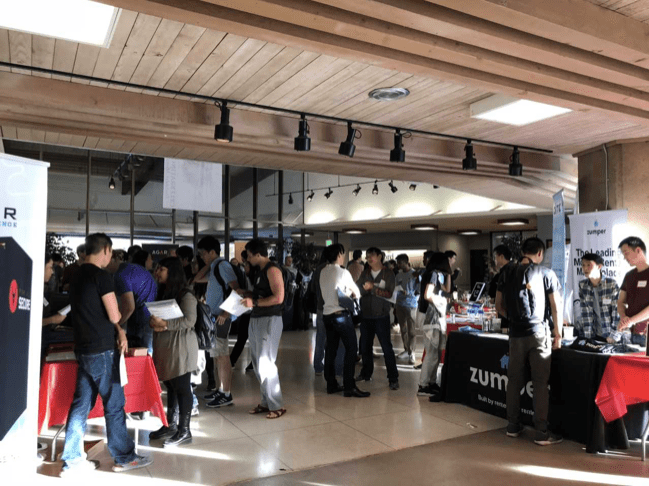Stanford students tend to view large tech companies more critically today than in the past, students and professors say. Still, tech giants offer valuable job opportunities that continue to appeal to young Silicon Valley engineers.
The New York Times has reported that interest in jobs at major tech companies is decreasing among today’s computer science majors. An Economist editorial coined the term “techlash” in 2013 to refer to a perceived backlash against major tech firms like Facebook, Google and Amazon. Since 2016, concerns about data privacy and election interference have added to criticism of Silicon Valley powerhouses.
“10 years ago, [students] may have looked at Facebook as, ‘Oh, it’s a social network, it’s a way to connect with friends,’” said computer science professor Mehran Sahami ’92 M.S. ’93 Ph.D. ’99. “Now they look at it with a more critical eye of, ‘Well, it can also be a platform, potentially, for the spread of disinformation or the creation of information bubbles.’”
Brandon Cui ’19, who now works for Facebook, described his coworkers as “concerned internally” about ethical issues like election interference. When he and his peers looked for jobs, however, “a lot of it came down to the opportunities a company provided,” Cui said.
Cui took a job researching artificial intelligence at Facebook partly because he’s interested in getting a Ph.D. related to the field in the future, he said. Smaller companies wouldn’t provide him with the same research opportunities as Facebook.
Many Stanford students consider it a smart career choice to spend time at well-known companies.
“You have that little thing that you could point to on your résumé,” said Kevin Yang ’19, who majored in computer science (CS).
Yang interned at Facebook one summer, but went a different route after graduation, founding a startup that makes web-automation tools. He has watched his father, who has a visual impairment, spend a lot of time on online tasks like replacing a lost credit card, and thought he could speed up the process with automation.
“I’ve always felt like if I had the chance, I would love to build some tool that could help people get the most out of technology,” Yang said.
The Stanford student group CS + Social Good, founded in 2015, aims to help students apply their technical skills for social impact. Sasankh Munukutla ’22, the group’s vice president, said the CS + Social Good Summer Fellowship program received a record number of applications this year.
“I think students in general are starting to feel that they would like to derive more meaning from their lives through doing impactful work,” Munukutla said.
He also said he thinks CS majors can make a positive difference in the world, wherever they work.
“I think the most important thing for us as students is to be thoughtful about our own actions and values,” Munukutla said. “People can be agents of change in their companies.”
Sahami, who is currently co-teaching CS 182: “Ethics, Public Policy and Technological Change” with political science professors Rob Reich and Jeremy Weinstein, said the matter of ethics at large tech companies “is not a black-and-white issue.”
“One of the things that I tell students is that, just because a company is a big tech company and there are issues with what it does, doesn’t suddenly mean it’s a place that you shouldn’t work,” Sahami said.
“If you take the stance that anyone with a strong sense of ethics shouldn’t go work for one of these big companies, then who’s left to work in those companies? People without a strong sense of ethics,” Sahami added.
Like Munukutla, he said ethically minded students can become internal change-makers at their workplaces.
Tech recruiting at Stanford
Large tech companies still see strong interest from young engineers, including Stanford students, although the future of job recruiting may look murkier for firms that have provoked more controversy on campus.
“Interest in working at Google was higher than ever in 2019,” wrote Google spokesperson Katie Hutchinson in an email to The Daily.
According to her, Google received 18% more job applications and 17% more internship applications in 2019 than in 2018.
Palantir, a Palo Alto-based software company which has attracted criticism for providing technology to ICE, stopped tabling at the Stanford Computer Forum in 2019. The company’s head of recruiting, Bonnie McLindon ’14, attributed the move to new hiring strategies.
“Between 2018 to 2019, we found we were having higher quality interactions by engaging with students in smaller groups,” McLindon said. “I would not say it has materially affected our ability to recruit top grads.”
McLindon said the percentage of new Palantir recruits coming from Stanford has decreased, but she did not provide specific numbers.
In November, members of the campus activist group Students for the Liberation of All People (SLAP) protested Stanford connections to Palantir, which was founded by Stanford alumni and, until recently, tabled at on-campus career fairs. Students at Duke, UC Berkeley and other universities have also staged anti-Palantir protests.
In March 2019, Phi Kappa Psi (Phi Psi) canceled an event with Palantir co-founder Joe Lonsdale ’03 following backlash from students concerned about 2012 allegations of sexual assault against Lonsdale.
Facebook did not respond to a request for comment about potential changes to its job application rates and recruiting strategies.
“The greatest driver of change in the way tech firms recruit is technology itself,” wrote Bill McIndoo, the branding and marketing manager at Stanford’s BEAM Career Education center, in an email to The Daily. “We respond to changes and trends in employment and the workplace.”
A previous version of this article misspelled Brandon Cui’s surname in one instance. The Daily regrets this error.
Contact Jasmine Kerber at jkerber ‘at’ stanford.edu.
